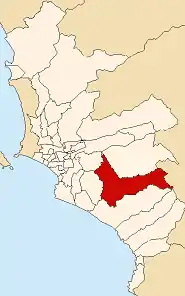Pachacámac District
The Pachacámac District is one of 43 districts of the Lima Province in Peru. The capital of the district is the village of Pachacámac. Its main asset is the archaeological Inca site Pachacámac.
Pachacámac | |
|---|---|
 Pachacámac archaeological site | |
 Coat of arms | |
 Location of Pachacamac in the Lima province | |
| Country | |
| Region | Lima |
| Province | Lima |
| Founded | January 2, 1857 |
| Capital | Pachacamac |
| Subdivisions | 11 populated centers |
| Government | |
| • Mayor | Guillermo Elvis Pómez Cano (2019-2022) |
| Area | |
| • Total | 160.23 km2 (61.87 sq mi) |
| Elevation | 75 m (246 ft) |
| Population (2022)[1] | |
| • Total | 152,272 |
| • Density | 950/km2 (2,500/sq mi) |
| Time zone | UTC-5 (PET) |
| UBIGEO | 150123 |
| Website | munipachacamac.gob.pe |
History
Pachacámac was first encountered by Hernándo Pizarro on January 30, 1530, while on his quest for gold and his search for a location of a new capital. In 1573 the city of Santísimo Salvador de Pachacámac was founded. In 1857, Pachacámac was founded as a republican district.[2]
Location
The district is located in the southern part of the Lima province at an elevation of 75m.
Political division
The district is divided into 11 populated centers (Spanish: Centros Poblados):
- Pachacamac
- Puente Manchay
- Tambo Inga
- Pampa Flores
- Manchay Alto Lote B
- Invasion Cementerio
- Manchay Bajo
- Santa Rosa de Mal Paso
- Cardal
- Jatosisa
- Tomina
Capital
The capital of the Pachacamac district is the village of Pachacamac.
See also
References
- "Estadística Poblacional - Ministerio de Salud del Perú".
- (in Spanish) Pachacamac Municipality, History, Retrieved October 31, 2007.
External links
- (in Spanish) Official web site
This article is issued from Wikipedia. The text is licensed under Creative Commons - Attribution - Sharealike. Additional terms may apply for the media files.